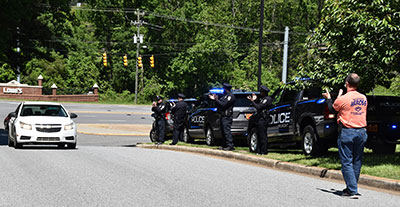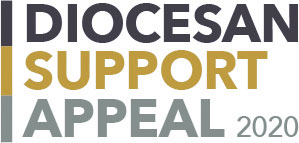‘Faith over fear’
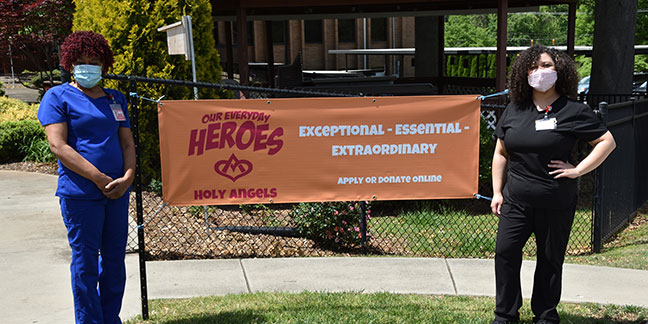 Health care heroes at Holy Angels were honored the week of April 27. (Photos provided by Holy Angels) BELMONT — Protecting the most vulnerable people among us is at the core of Holy Angels’ mission. Day in, day out, the staff gives tirelessly of themselves in this long-term residential program to care for children and adults who have delicate medical conditions.
Health care heroes at Holy Angels were honored the week of April 27. (Photos provided by Holy Angels) BELMONT — Protecting the most vulnerable people among us is at the core of Holy Angels’ mission. Day in, day out, the staff gives tirelessly of themselves in this long-term residential program to care for children and adults who have delicate medical conditions.
Contracting COVID-19 could prove fatal for any one of Holy Angels’ residents.
“So far, Holy Angels has not had any cases of COVID-19, with residents and staff,” says Regina Moody, Holy Angels’ president and CEO. “We live each day in ‘faith over fear.’ We follow the CDC guidelines as well as the North Carolina mandates. This has been difficult, especially for our families who are unable to visit,” she adds.
Holy Angels’ staff have kept up residents’ daily routines and helped comfort them since the pandemic began and visitors were barred from health care facilities in North Carolina. Staff are using Facetime and other video conferencing tools to help residents communicate with their loved ones during pandemic.
Charli Somers, SCR program director, says, “It is important for me to continue coming to work for our residents. They are not able to go elsewhere, so I feel it is important for us to show up for them, to ensure they aren’t feeling uneasy or scared but instead feel nothing but love during these strange times.”
Somers knows it is difficult for residents not to see their families, “and while we cannot replace their family, we sure are trying to keep them engaged and happy! It is so important that during these times we maintain the highest level of normalcy that we can, even if only between the walls of Holy Angels.”
Care providers at Holy Angels, these everyday heroes, have increased the protective measures and equipment they are using to keep residents healthy while the novel coronavirus remains a health threat.
Staff are using personal protective equipment while caring for residents and they are taking precautions in their off hours, staying away from their own loved ones in some instances so they don’t accidentally bring COVID-19 in to Holy Angels.
Fannie Rendlemen, a clinical secretary and health care technician who has served at Holy Angels for the past 36 years, is doing her part to keep residents safe.
“I have taken precautions such as wearing my mask outside Holy Angels,” she says. “I limit where I go. I haven’t seen my granddaughter in person since the Angel Bowl (March 7). I’m just trying to be very cautious. I don’t want to bring anything back to the residents.”
April 27 marked 50 days since the quarantine began at Holy Angels, so to acknowledge the heroic efforts of the staff, management and local authorities honored the health care heroes.
“We felt this was a time to celebrate all of our staff who work tirelessly to support our residents,” Moody says. “Our local police and fire department came and welcomed the staff early that morning and again in afternoon for the second shift. It was very nice and moving.”
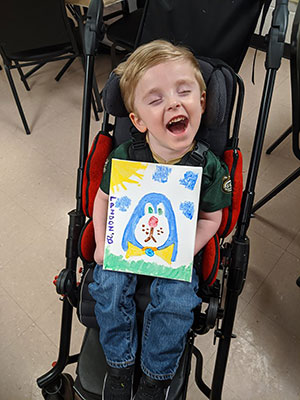 “We are grateful to the City of Belmont and the first responders (who came out). They are really supportive of Holy Angels and we are grateful they came here. It was a beautiful day,” she says.
“We are grateful to the City of Belmont and the first responders (who came out). They are really supportive of Holy Angels and we are grateful they came here. It was a beautiful day,” she says.
During that week, Holy Angels gave their staff “Everyday Heroes” T-shirts, heroes Hershey bars and personalized face masks to say thank you.
The increased need for protective measures and equipment at Holy Angels means that costs associated with residents’ care have mounted during a time when donations have dwindled and fundraising events have had to be canceled.
Holy Angels has also had to temporarily close the businesses and programs that fund its mission, including The Cherub Café, Cotton Candy Factory, Bliss Gallery, Spruced Goose Station and more.
“Our loss of revenue from programs, businesses and reduction/cancellation of fundraisers has resulted in a $1.2 million shortfall,” Moody says.
Moody expects increased costs for personal protective equipment and cleaning services going forward, which will add to Holy Angels’ financial needs.
“We are using much more PPE than we ever have,” she explains. “That need is going to be a constant for us. Additional precautions have ramped up our cleaning costs considerably.”
Holy Angels has also redeployed people in some of its businesses to environmental services to assist in critical care services for residents.
“Our goal is to keep people working,” Moody says.
“During the COVID-19 pandemic, it is extremely important to ensure we are taking all of the appropriate precautions to prevent residents from getting sick,” says Ashley Brown, special education teacher.
Brown emphasizes, “Their lives depend entirely on the staff caring for them and protecting them from harm. Unlike other jobs, Holy Angels does not close down. The kids’ lives continue, so it’s not a profession that can stop during a crisis. The job still needs to be done every hour of the day.”
— SueAnn Howell, senior reporter
Help Holy Angels

Holy Angels depends partly on donations to provide the highest quality care for children and adults with delicate medical conditions.
The Holy Angels Foundation is a private, nonprofit corporation and sponsored ministry of the Sisters of Mercy of the Americas, South Central Community.
To donate to Holy Angels, visit the website at www.HolyAngelsNC.org. Donations can also be mailed to: Holy Angels, P.O. Box 710, 6600 Wilkinson Blvd., Belmont, N.C. 28012. Questions? Call 704-825-4161.
CHARLOTTE — Feelings of anxiety, loneliness and depression are becoming more widespread during the COVID-19 pandemic. In response, Catholic Charities Diocese of Charlotte’s mental health counseling program has shifted from in-person to “tele-counseling” to make sure their clients continue getting this much-needed help.
“When in-person meetings were suspended on March 19, our immediate priority as a program was to find a way to continue mental health services for our existing clients,” said Bryan Sullivan, a licensed professional counselor supervisor with Catholic Charities. “At the time, there were 180 adults and couples who were under the care of our three full-time and one part-time licensed mental health counselors.”
Within two weeks the counselors, who provide individual and couples therapy in the Charlotte, Winston-Salem, Greensboro and Asheville areas, transitioned to an easy-to-use, HIPAA-compliant telehealth platform in which people use their computer, mobile phone or tablet to have a one-on-one confidential video session with a counselor. Clients receive the same level and types of services as with in-person sessions.
Only existing clients are currently part of the new tele-counseling effort, but Catholic Charities hopes to open the program to new applicants by the end of May, which is Mental Health Month.
“We are very excited to extend our mental health therapy during this time of COVID-19,” said Catholic Charities’ executive director, Dr. Gerard Carter. “We are even more excited to identify concrete ways in which we can employ telehealth to offer these services to those who live in rural areas across the diocese.”
In providing tele-counseling services, Catholic Charities had to consider several important factors and challenges, Sullivan noted.
Your DSA contributions at work
Some Catholic Charities Diocese of Charlotte programs are funded in part by contributions from the annual Diocesan Support Appeal. Learn more about the DSA and how you can contribute at www.charlottediocese.org/dsa.
“Many of those issues included choosing a telecommunication platform that served to maintain our standards for ethical care that meets HIPAA compliance guidelines and agency accreditation standards,” he said. “It was also important that we select a reliable, secure, user-friendly telecommunication product that we also had the technical support to maintain. We also had to problem-solve a way to get appropriate consent from our clients in order to render this service in line with best practice guidelines.”
Clients who agree to participate get an email invitation with instructions on how and when to join the session. Sessions last about an hour, just as they would have been in person.
“The vast majority of our clients have given us very positive feedback on this service thus far,” Sullivan said. “They have expressed that they are grateful that we have been able to continue to provide care.”
With each passing week that in-office operations remain suspended, more clients are opting for tele-counseling.
“This platform provides access to exceptional mental health care for everyone, and we remain deeply committed to ensuring access to care,” said Sharon Davis, program assurance director for Catholic Charities.
— Kimberly Bender, Online reporter
More online
At www.mhacentralcarolinas.org: Catholic Charities’ Mental Health Counseling has a relationship with Mental Health America of Central Carolinas. Learn more about mental health or get immediate assistance after business hours on their website.
‘We have been willing to make sacrifices because negligence on our part could mean death to others’
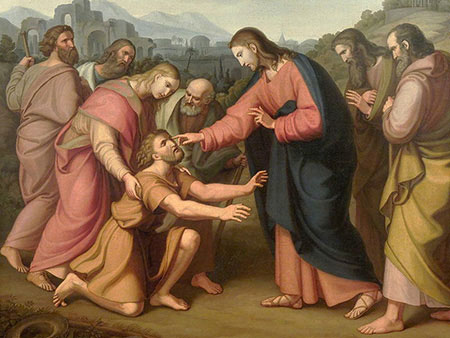 CHARLOTTE — As people increasingly chafe against public health restrictions in place to combat the COVID-19 pandemic, it is important to practice Christian love towards others.
CHARLOTTE — As people increasingly chafe against public health restrictions in place to combat the COVID-19 pandemic, it is important to practice Christian love towards others.
That was the message from Bishop Peter J. Jugis during Mass on May 17 – a little over a week since N.C. Gov. Roy Cooper began slowly easing restrictions on non-essential business, travel and public gatherings. Churches, however, were still prohibited from allowing more than 10 people inside at a time until late Saturday, when a circuit court judge issued a temporary restraining order against enforcing the governor’s restrictions on places of worship. Thanks to the temporary order, which remains in effect for at least 14 days, churches may now offer indoor worship services with few limitations for the first time since the pandemic hit North Carolina in mid-March.
Only a couple of Catholic churches in the diocese modified their Sunday plans following the May 16 ruling and subsequent guidance from the Chancery, allowing pastors to exercise discretion in resuming indoor Masses while continuing public health protocols such as social distancing and sanitizing high-touch surfaces between services.
St. Patrick Cathedral chose to move ahead with the two outdoor Masses it already had scheduled May 17, as well as a private Mass with the bishop that was streamed live to the cathedral’s Facebook page for the people of the diocese.
In his homily for the Sixth Sunday of Easter, Bishop Jugis reflected on the day’s Gospel from John 14:15-21, in which Jesus tells His disciples, “If you love me, you will keep my commandments.”
“During this coronavirus pandemic we have been practicing Christian love in a very exceptional way,” the bishop said. “We’ve been able to make sacrifices for others and accept limitations on our activity out of love and compassion for others – out of consideration for the sick and the suffering, compassion for the dying and for those grieving the death of a family member, out of concern for the elderly and the vulnerable whose health is compromised.
“Because of our Christian love for them, we have been willing to make sacrifices because negligence simply on our part could very well mean death to others.”
Christian love is not selfish, nor is it merely a humanitarian love, he explained.
“Christian love has its starting point in God, the Triune God – the love of the Father and the Son and the Holy Spirit. That love which comes from the heart of a loving God, the Holy Spirit places into our hearts, and God transforms us because of His Presence in us.”
Jesus describes love in the two greatest commandments: “Love of God with all your heart, all your mind, all your soul, all your strength; and love of neighbor as yourself.”
That commandment to love is “so especially appropriate for us during these days,” Bishop Jugis said. Christians should be “ambassadors of that divine love.”
“During this time of stress, and some confusion and uncertainty, let us continue to be flexible and let the love of God be our guiding light,” he entreated. “As we celebrate our new life in Christ during this Easter season – as children of God, citizens of a kingdom not of this world – let the love of God which is in our hearts be seen by others in what we say and do.”
— Patricia L. Guilfoyle, editor
Pictured at top: “Healing the Blind Man” by Václav Mánes (1832)


